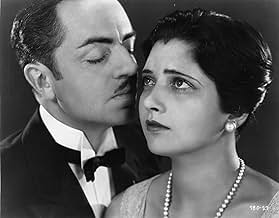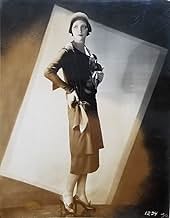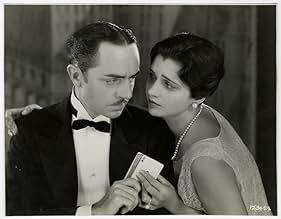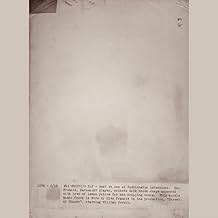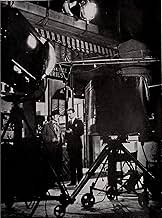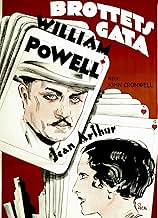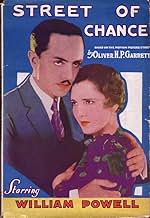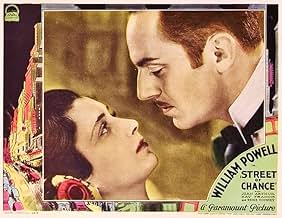Füge eine Handlung in deiner Sprache hinzuA big-time, but honest gambler has to prevent his younger brother from following in his footsteps, and taking up gambling.A big-time, but honest gambler has to prevent his younger brother from following in his footsteps, and taking up gambling.A big-time, but honest gambler has to prevent his younger brother from following in his footsteps, and taking up gambling.
- Für 1 Oscar nominiert
- 3 Gewinne & 1 Nominierung insgesamt
Oscar Apfel
- Bartender
- (Nicht genannt)
G. Pat Collins
- Police officer
- (Nicht genannt)
John Cromwell
- Imbrie
- (Nicht genannt)
Gordon De Main
- Gambler
- (Nicht genannt)
Jack Luden
- Holland House Hotel Clerk
- (Nicht genannt)
William H. O'Brien
- Waiter
- (Nicht genannt)
Broderick O'Farrell
- Gambler
- (Nicht genannt)
Empfohlene Bewertungen
This was quite enjoyable on a few levels. The lead actors in general has good strong performances, with Kay Francis having a few bad scenes. I blame the director for choosing those because other scene with her were totally believable. At first the story seemed a little confusing but quickly was understandable. A couple favorite scenes of mine were where William Powell finishes talking to Kay Francis and then walks out. Most films of the time would have cut the moment he walked out, but the camera kept rolling and we saw Francis slump down in dispare. The other favorite was the top down card scene towards the end. Overall, I would mainly recommend this to fans of the Thin Man series or other serious "black and white fans." It's definitely a hidden gem.
When, many moons ago, I interviewed director John Cromwell for an article I was preparing on the first big gangster-film star of the late Twenties/early Thirties, George Bancroft, I mentioned STREET OF CHANCE (Paramount; 1930) to him as an aside, it not containing Bancroft. His initial response was to confuse its genesis with gambler Nicky Arnstein, who, if I recall correctly, was married to Fannie Brice; but upon my putting forth Arnold Rothstein as the more likely source, he agreed. Arnstein was a gambler and apparent scoundrel; Rothstein also a gambler albeit far more notorious, infamously credited with having fixed a baseball World Series; his shooting death in 1928 was never solved. In STREET OF CHANCE, the shooting of the William Powell gambler is implied without being shown; his dying words, given in an ambulance rushing him to a hospital in response to an attendant's bet that he'll live, signals the film's final fadeout, these being, "You lose." When I complimented the director on this powerful, yet understated finale, he modestly responded something like, "Well, that's the kind of thing we were trying to do then." If, as John implied, such creativity was the order of the day, I've seen scant examples worthy of this one! Paramount remade the film in 1937 as HER HUSBAND LIES, starring Ricardo Cortez as the ill-fated gambler. A good little film, but lacking the tour-de-force quality engendered by the original which, sad to say, is a virtually forgotten motion picture.
Regards, Ray Cabana, Jr.
Regards, Ray Cabana, Jr.
In watching the early Paramount talkies with William Powell it never ceases to amaze that Powell stage trained voice that he had apparently knew instinctively how to modulate for the new medium of talking motion pictures. It was why he was able to have three successful Philo Vance films and Street Of Chance is in the same mode.
Powell's character of 'Natural' Davis is of course modeled on the legendary Arnold Rothstein who gambled with quite a bit more than just games of chance. This is the life Powell has chosen for himself and he and wife Kay Francis are content. He's the best at what he does in a business filled with uncertainty.
But this is not a life he wants for his brother Regis Toomey who comes into town wanting to try the gambling world and be the best like 'Natural Davis. That's not what Powell wants for his kid brother, he wants Toomey to be and stay respectable. Tragedy results when Powell tries some desperate means to keep Toomey from the life.
Powell and Francis are at the top of their game and Toomey registers well as the eager younger brother. Jean Arthur is here as well, but she's really not the Jean Arthur who developed later on in those Thirties screwball comedies, she took quite a while to develop as a screen personality.
Street Of Chance shows William Powell at really good advantage in a carefully delineated role. For his fans definitely catch this one.
Powell's character of 'Natural' Davis is of course modeled on the legendary Arnold Rothstein who gambled with quite a bit more than just games of chance. This is the life Powell has chosen for himself and he and wife Kay Francis are content. He's the best at what he does in a business filled with uncertainty.
But this is not a life he wants for his brother Regis Toomey who comes into town wanting to try the gambling world and be the best like 'Natural Davis. That's not what Powell wants for his kid brother, he wants Toomey to be and stay respectable. Tragedy results when Powell tries some desperate means to keep Toomey from the life.
Powell and Francis are at the top of their game and Toomey registers well as the eager younger brother. Jean Arthur is here as well, but she's really not the Jean Arthur who developed later on in those Thirties screwball comedies, she took quite a while to develop as a screen personality.
Street Of Chance shows William Powell at really good advantage in a carefully delineated role. For his fans definitely catch this one.
William Powell is on the "Street of Chance" in this 1930 film also starring Kay Francis, Jean Arthur, and Regis Toomey.
I will admit right off that I did not recognize either Arthur or Toomey in this film.
Powell plays "Natural" Davis, a character modeled on the famed gambler Arnold Rothstein. The film portrays a couple of incidents in Rothstein's life, but in my opinion, the character is very loosely based on Rothstein.
Natural Davis is a professional gambler, and as a result, his wife Alma (Kay Francis) is divorcing him. He begs her to stay with him, eventually promising her that he will not only quit gambling, but go away with her on an extended trip..
When is brother Babe (Toomey) comes to town, Natural learns that his wedding gift of $10,000 has been spent gambling. Babe is a big winner and now has $50,000. He's in New York to gamble for $100,000 more so he can buy into a partnership.
Let me pause for a minute. The amounts of money these people are talking about are unbelievable. In 1930, $100,000 was 1,611,946.11 in today's money! Usually in films people are robbing banks for $5,000 or trying to get $50 from someone.
To continue - Natural does not want his brother to pursue the life of a gambler, so he's determined to make sure Babe is cleaned out. He arranges for his associates to help him, joining Babe in a game. It doesn't quite work out as he hoped. In a bind, he has to break his promise to Alma temporarily, but she doesn't buy it.
Powell is natural and very effective, and the film moves quickly, with people picking up their dialogue cues. Often in early talkies, actors were still adjusting to sound. As a result you get pauses between lines of dialogue, and, because of stage training, big gestures and loud voices. Powell has none of this. He's tough yet elegant and sympathetic yet ruthless.
Francis doesn't have much to do as Natural's suffering wife, but she's very good. The rest of the acting is fine, but you could have knocked me over with a feather when I learned that Babe was Regis Toomey and his wife was Jean Arthur! Arthur had none of the characteristics she later developed. Here, she's pure ingenue.
One of the most interesting things about these precode films is that because there is no Hayes code, the ending is not predictable as it is in many later films. The end of this kind of surprised me.
I will admit right off that I did not recognize either Arthur or Toomey in this film.
Powell plays "Natural" Davis, a character modeled on the famed gambler Arnold Rothstein. The film portrays a couple of incidents in Rothstein's life, but in my opinion, the character is very loosely based on Rothstein.
Natural Davis is a professional gambler, and as a result, his wife Alma (Kay Francis) is divorcing him. He begs her to stay with him, eventually promising her that he will not only quit gambling, but go away with her on an extended trip..
When is brother Babe (Toomey) comes to town, Natural learns that his wedding gift of $10,000 has been spent gambling. Babe is a big winner and now has $50,000. He's in New York to gamble for $100,000 more so he can buy into a partnership.
Let me pause for a minute. The amounts of money these people are talking about are unbelievable. In 1930, $100,000 was 1,611,946.11 in today's money! Usually in films people are robbing banks for $5,000 or trying to get $50 from someone.
To continue - Natural does not want his brother to pursue the life of a gambler, so he's determined to make sure Babe is cleaned out. He arranges for his associates to help him, joining Babe in a game. It doesn't quite work out as he hoped. In a bind, he has to break his promise to Alma temporarily, but she doesn't buy it.
Powell is natural and very effective, and the film moves quickly, with people picking up their dialogue cues. Often in early talkies, actors were still adjusting to sound. As a result you get pauses between lines of dialogue, and, because of stage training, big gestures and loud voices. Powell has none of this. He's tough yet elegant and sympathetic yet ruthless.
Francis doesn't have much to do as Natural's suffering wife, but she's very good. The rest of the acting is fine, but you could have knocked me over with a feather when I learned that Babe was Regis Toomey and his wife was Jean Arthur! Arthur had none of the characteristics she later developed. Here, she's pure ingenue.
One of the most interesting things about these precode films is that because there is no Hayes code, the ending is not predictable as it is in many later films. The end of this kind of surprised me.
Unlike a lot of very early talkies, this was made by a director for whom the introduction of sound didn't make him forget how to make films. It's clearly not as technologically advanced as pictures made just a year later but it's a remarkably professionally executed and well acted film.
Like the previous picture John Cromwell made for Selznick, THE DANCE OF LIFE, this also has none of those awful traits which blighted the very early talkies. It's dynamic, it's realistic and its dialogue feels natural. Scenes are allowed to develop and play out - there's none of that: switch the camera on - say the lines - switch the camera off technique common in say some Warner Brothers pictures where every foot of celluloid had to be accounted for. You're given the luxury to fully absorb what you're seeing - and indeed hearing. Such a pace could in a lesser movie result in a static, talky meandering malaise but fortunately this film's lively script and realistic characters keep your interest.
In an era of often simplistic stories, this is a surprisingly mature and intelligent offering. It's a serious and somber film about serious and somber issues but it successfully manages to distill all of that neatly into ninety minutes. Many years later Warners tackled the problem of gambling with its Edward G Robinson vehicle, DARK HAZARD. That had a much more light hearted approach which made it more accessible but although this isn't as enjoyable - you'll not smile much watching this - it's just as engrossing.
It's a real revelation to see William Powell not playing the usual debonair sophisticated cool guy. For a change, he's a somewhat damaged and unpleasant character but William Powell of course is just so likeable you're immediately on his side. The one loose wheel in this picture is, as is so often the case, Kay Francis. She was pretty good in a few films but her default affected acting style, gazing wistfully into the distance to speak her lines feels out of step with the rest of this film. I don't think she was quite ready for a lead part just yet in her career.
It's a good film, it's entertaining and it skilfully builds up the tension to an astonishing level towards the end but it's perhaps a film you appreciate more than you actually enjoy.
Like the previous picture John Cromwell made for Selznick, THE DANCE OF LIFE, this also has none of those awful traits which blighted the very early talkies. It's dynamic, it's realistic and its dialogue feels natural. Scenes are allowed to develop and play out - there's none of that: switch the camera on - say the lines - switch the camera off technique common in say some Warner Brothers pictures where every foot of celluloid had to be accounted for. You're given the luxury to fully absorb what you're seeing - and indeed hearing. Such a pace could in a lesser movie result in a static, talky meandering malaise but fortunately this film's lively script and realistic characters keep your interest.
In an era of often simplistic stories, this is a surprisingly mature and intelligent offering. It's a serious and somber film about serious and somber issues but it successfully manages to distill all of that neatly into ninety minutes. Many years later Warners tackled the problem of gambling with its Edward G Robinson vehicle, DARK HAZARD. That had a much more light hearted approach which made it more accessible but although this isn't as enjoyable - you'll not smile much watching this - it's just as engrossing.
It's a real revelation to see William Powell not playing the usual debonair sophisticated cool guy. For a change, he's a somewhat damaged and unpleasant character but William Powell of course is just so likeable you're immediately on his side. The one loose wheel in this picture is, as is so often the case, Kay Francis. She was pretty good in a few films but her default affected acting style, gazing wistfully into the distance to speak her lines feels out of step with the rest of this film. I don't think she was quite ready for a lead part just yet in her career.
It's a good film, it's entertaining and it skilfully builds up the tension to an astonishing level towards the end but it's perhaps a film you appreciate more than you actually enjoy.
Wusstest du schon
- WissenswertesThe Alfred Hitchcock Hour (1962-1965) remade this story under the title of "A Piece of the Action" starring Gig Young and Robert Redford. It was the premier program of the show.
- VerbindungenFeatured in David O. Selznick: 'Your New Producer' (1935)
Top-Auswahl
Melde dich zum Bewerten an und greife auf die Watchlist für personalisierte Empfehlungen zu.
- How long is Street of Chance?Powered by Alexa
Details
- Erscheinungsdatum
- Herkunftsland
- Sprache
- Auch bekannt als
- Brottets gata
- Drehorte
- Produktionsfirma
- Weitere beteiligte Unternehmen bei IMDbPro anzeigen
- Laufzeit
- 1 Std. 15 Min.(75 min)
- Farbe
- Seitenverhältnis
- 1.20 : 1
Zu dieser Seite beitragen
Bearbeitung vorschlagen oder fehlenden Inhalt hinzufügen

